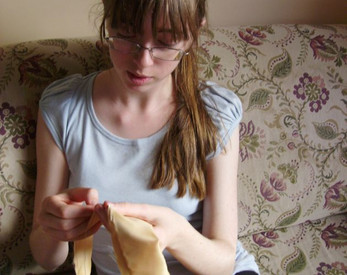My 16-Year-Old Self Rants About How the Government Wants Them Dead
[EARLY ACCESS / PROTOTYPE]
A story in which my 28-year-old self wakes up in the body of my 16-year-old self, proceeds to research ways of not living in an abusive household, realises that many of those ways sucks and then complains about how much the government wants them dead. The time travel scenario is fictional but Centrelink being shit is an important work of non-fiction.
This game was originally created for the Post-Police Design Challenge 2020.
Content Warnings
Domestic violence, abuse, social workers, welfare programs, mental illness, underage prostitution. This story aims to inform rather than shock, therefore most of those themes are touched on rather than detailed. Two specific sections are optional for the story and have additional CWs: one provides an explicit example of gaslighting and one which discusses teenage prostitution (non-explicit but might still be triggering). Please take care of yourself before, during and after play.
Post-Police Design
I based the setting of this game on the laws and social systems that applied in Victoria, Australia in 2008. There have been a number of improvements since in the way domestic violence cases are handled by police and courts (with special credit to the advocacy work of Rosie Batty), though changes to the welfare system have lagged and many key services remain underfunded, such that the situation I have outlined for 2008 still very much applies today. I've drawn on my own experience to an extent, though the big difference between my current self and my younger self is that I now know that I was being abused. My younger self wanted out, but didn't know why. I managed to move out at age 19, once I had a well-paying job, but the worst of the abuse I suffered likely began around age 10-12 and continued in one form or another until about age 25.
In imagining a world without police - the core focus of the Post-Police Design Challenge - I've looked at the circumstances of a young person attempting to escape from abuse and the things that stand in their way. Police currently end up in the picture either when a young person becomes homeless or commits a crime, or when they are called to address a violent situation. In those situations, the role of the police involves forcing young people back to abusive homes, into new homes without their choice or into prison. In an ideal world, we would listen to, believe and empower young people to make their own choices about their living situation.
The story is told from the perspective of a white person (me), and I acknowledge that my experience is not universal. The way that my white, high-income parents were constantly given the benefit of the doubt in raising me stands at ends with the attempted genocide that was the Stolen Generation, and the continued forced removal of Indigenous children from their homes and communities. Additionally, I note that in Australia, Indigenous young people are 24 times more likely to be incarcerated than non-Indigenous youths (source: Change the Record), and that no police or prison officer has yet been convicted in relation to the 438 deaths in custody since the Royal Commission into Aboriginal Deaths in Custody which concluded in 1991. Bla(c)k Lives Matter.
I calculated the max Youth Allowance + Rent Assistance rate for a 16-year-old as $239.75/week as of February 2008, and in 2020, it's about $301.05/week - plus a temporary "Coronavirus supplement" of $275/week. It's well past time to raise the rate.
| Status | Prototype |
| Platforms | HTML5 |
| Rating | Rated 5.0 out of 5 stars (4 total ratings) |
| Author | luciellaes |
| Genre | Interactive Fiction, Educational |
| Made with | Twine |
| Tags | acab, First-Person, Twine |

Comments
Log in with itch.io to leave a comment.
I like the premise of older-self, younger-self. It is well written enough and I found it to be informative. I am not generally a fan of fiction that is primarily a vehicle to deliver a message, but that is just me. It kept my interest.
I did expect more of a difference of perspective between older self and younger self, simply because that is what most of us experience (i.e., if only I knew then what I know now), but this story does the opposite (spoiler?) in that it uses the older self younger self theme to reinforce that the decisions made by younger self were the only rational options (if I understood it correctly).
I get the point, I think, although I am not sure I entirely agree with it. On the other hand, if those choices led to an improved life, maybe they were the right decisions.
Still, it would have been nice to see deeper self reflection to balance the focus on external barriers and restraints.